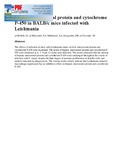| dc.contributor.author | al-Mofleh, IA | |
| dc.contributor.author | al-Khuwaitir, SA | |
| dc.contributor.author | Mahmoud, AA | |
| dc.contributor.author | Kyegombe, DB | |
| dc.contributor.author | al-Tuwaijri, AS | |
| dc.date.accessioned | 2013-06-10T09:54:45Z | |
| dc.date.available | 2013-06-10T09:54:45Z | |
| dc.date.issued | 1989 | |
| dc.identifier.citation | J Gastroenterol Hepatol. 1989 Nov-Dec;4(6):513-9 | en |
| dc.identifier.uri | http://hinari-gw.who.int/whalecomwww.ncbi.nlm.nih.gov/whalecom0/pubmed/2491220 | |
| dc.identifier.uri | http://erepository.uonbi.ac.ke:8080/xmlui/handle/123456789/30629 | |
| dc.description.abstract | The effects of infection of mice with Leishmania major on liver microsomal protein and cytochrome P-450 were examined. The levels of hepatic microsomal protein and cytochrome P-450 were monitored at 6, 7, 9 and 12 weeks post-infection. The results indicated that the amount of hepatic microsomal protein and cytochrome P-450 were unchanged throughout the course of infection with L. major, despite the high degree of parasite proliferation in Kupffer cells and marked reduction in phagocytosis. The current results clearly indicate that Leishmania-induced macrophage suppression has no inhibitory effect on hepatic microsomal protein and cytochrome P-450 | en |
| dc.language.iso | en | en |
| dc.title | Hepatic microsomal protein and cytochrome P-450 in BALB/c mice infected with Leishmania | en |
| dc.type | Article | en |
| local.publisher | Department of Medicine, University of Nairobi, Kenya. | en |
| local.publisher | Department of Medicine, King Saud University, Riyadh, Saudi Arabia | en |

